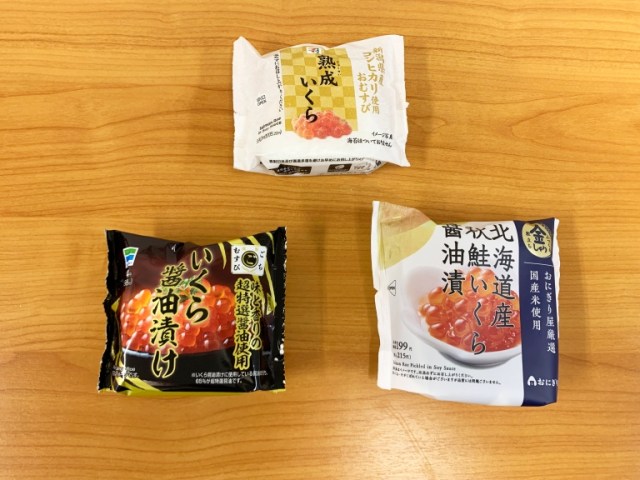
The big three all have their own salmon roe onigiri, but which one is right for you?
Of the many reasons to love Japanese convenience stores, one of the most compelling is that every single one of them is stocked with onigiri (rice balls). It’s a classic case of being spoiled for choice, though, because having so many options can make it hard to pick just one.
For example, 7-Eleven, Family Mart, and Lawson, the big three of Japanese convenience stores, all have ikura (salmon roe) onigiri as part of their regular rice ball lineup, so where should you head to satisfy your craving? That’s what we intended to find out by dissecting and then eating all three.
▼ Clockwise from top: 7-Eleven, Lawson, Family Mart
Yes, dissecting…or maybe we should say disassembling? See, convenience store ikura onigiri are a delicious paradox. Like just about everything in a convenience store, they’re an affordable luxury, but salmon roe itself is an expensive ingredient, and since it’s on the inside of the rice ball, we decided to open the three chain’s onigiri up to see who’s giving you the most bang for your buck/yippee for your yen.
First, though, we had to buy them. The typical convenience store onigiri is about 150 yen (US$1.30), but ikura ones are more expensive. Of our three, 7-Eleven’s was the cheapest, at 190 yen, followed by Family Mart’s at 198 yen, leaving Lawson’s at the top of the price list at 215 yen.
To see how much ikura gives you, first we peeled off the seaweed wrapping from those that had one, then we used a knife to cut away the rice and get to the ikura core, being careful not to smush any spheres along the way.
▼ Clockwise from top: 7-Eleven, Lawson, Family Mart
At the initial visual check, Family Mart looks to have the most ikura, and by a pretty wide margin. Lawson comes in second, but there’s not much of a gap between it and 7-Eleven.
Looks can be deceiving, though, so we decided to have our reporter Seiji Nakazawa take inventory, counting the individual number of eggs in each onigiri.
▼ Still a better day at work than the time Seiji had to bring a set of clothes to our half-naked boss after he got picked up by the cops.
The final tally came to:
● 7-Eleven 30
● Lawson: 49
● Family Mart: 90
Sure enough, the numerical data matched our first impressions. Seiji did notice though, that Family Mart’s eggs seemed a little smaller in size than the other two chains’ did.
▼ Clockwise from top: 7-Eleven, Lawson, Family Mart
As a reward for Seiji’s hard work, we also let him taste-test the three chains’ onigiri, and he was surprised to find some pretty clear differences. Despite having the smallest amount of it, 7-Eleven’s onigiri isn’t at all lacking in ikura presence. Seiji credits that to the high quality of the rice used in 7-Eleven’s onigiri, and the fact that it’s the only onigiri of the three that doesn’t have a seaweed wrapping, and thus has one fewer flavor to compete with the ikura for attention, probably helps too.
The Family Mart onigiri also packs plenty of ikura flavor, and it comes seasoned with a soy sauce-base marinade, giving it a uniquely rich and salty taste.
That leaves Lawson as sort of the odd onigiri out. There’s nothing wrong with it, though. It just doesn’t have much identity of its own, though it’s plenty tasty if you want a low-key, balanced kind of ikura onigiri.
Ultimately, just like with Japanese convenience stores’ nitamago, the best ikura onigiri for you is going to depend on your individual preferences, though none of these is a bad choice. Just make sure you open them carefully.
Photos ©SoraNews24
● Want to hear about SoraNews24’s latest articles as soon as they’re published? Follow us on Facebook and Twitter!
[ Read in Japanese ]
Follow Casey on Twitter, where he appreciates everyone who got the “how much ikura” joke.